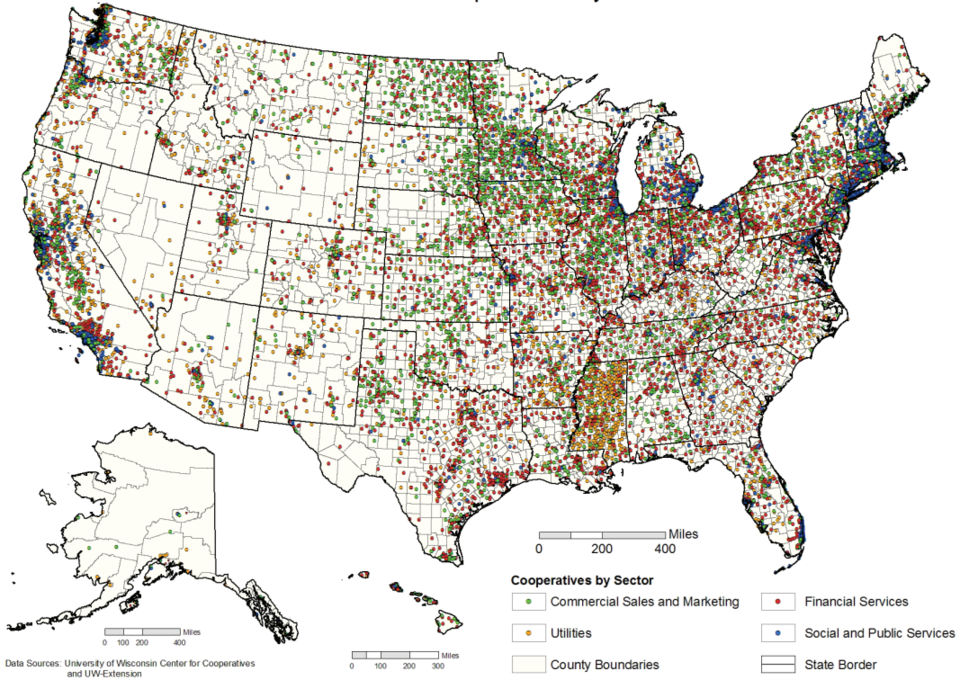There is a long list of places Clark Banack has researched and visited in his study of cooperative run businesses. Of all jurisdictions, the one that sticks out as being similar to Alberta in many ways is Wisconsin, but the state is thousands of miles ahead when it comes to the cooperative ecosystem it has in rural communities, Banack said.
At the Reimagining Rural Economic Development Conference in Camrose on Oct. 26, Courtney Berner, executive director of the University of Wisconsin Centre for Cooperatives, and Clark Banack, director of the Alberta Centre for Sustainable Rural Communities, shared examples from Wisconsin co-ops that could help rural Alberta deal with pressing community needs and problems that lie ahead.
“A cooperative is a business or enterprise that is owned or controlled by those who use its services. It's extremely nimble in its application,” Berner said.
Wisconsin has over 700 co-ops, many formed to address needs for housing, health care, broadband networks, and other issues all too familiar in rural Alberta. A recent area of focus for Berner and her team is the promotion of worker co-ops as a sound succession strategy for business owners approaching retirement.
More businesses were founded in the U.S. by those born between 1946 and 1964 than any other generation, Berner said. Though half of U.S. businesses are owned by baby boomers, between 60 and 85 per cent of businesses have no plan in place to transfer ownership when they retire.
The wave of boomer retirement and succession is cresting in Canada as well. Three-quarters of small business owners are planning to exit their business in the next ten years, and retirement is the main reason cited for leaving their business, according to the Canadian Federation of Independent Business. Finding a suitable buyer or successor is the main hurdle business owners are facing as they approach retirement.
“When a business leaves a rural community, it’s not just the jobs. It’s the services, it’s the tax base, it’s how main street looks, it’s the feel of the place,” Berner said.
“So we have really doubled down on our efforts to help business owners and those who support them understand this option of selling to their employees.”
One of the benefits of employee ownership is the legacy business owners feel when they’re preparing to step aside.
“It doesn't feel good to know that you're closing down a business that people depend upon or jobs or services,” she said.
“Whether we're talking about rural or urban communities, a lot of businesses just don't have people who want to buy them or can buy them. And oftentimes employees are the most viable buyer.”
Berner gave a recent example of veterinarians who owned two clinics and didn’t want to see them scooped up by private equity firms.
“These people didn't want that for their employees. They didn't want that for their customers or their animals. And we worked with them to combine the two businesses and convert them to a co-op,” she said.
Part of the reason the co-op ecosystem is more robust south of the border is the strong bipartisan support the model receives and recognition of its economic merits from all levels of government.
“I often encounter the notion here in Alberta that co-ops are a lefty idea, and by and large I've never got the impression that a conservative provincial government has been really materially interested in supporting them,” Banack said.
While in Wisconsin, Banack met with a “hardcore conservative Republican” lawmaker who had been instrumental in pushing through substantial funding for co-op feasibility studies. When Banack told him rural politicians in Alberta don’t tend to see co-ops as a legitimate solution, he was taken aback.
“He grew up in several rural co-ops, and was convinced that they were essentially a ticket to rural community survival. They were about community self-reliance, about regular people coming together to accomplish something important for the community,” Banack said.
“We're not talking about non-profit charity cases. We're talking about starting to get into businesses that just happen to be cooperatively owned, and therefore the community, the locals share much more control and profits than some other businesses,” he said.




